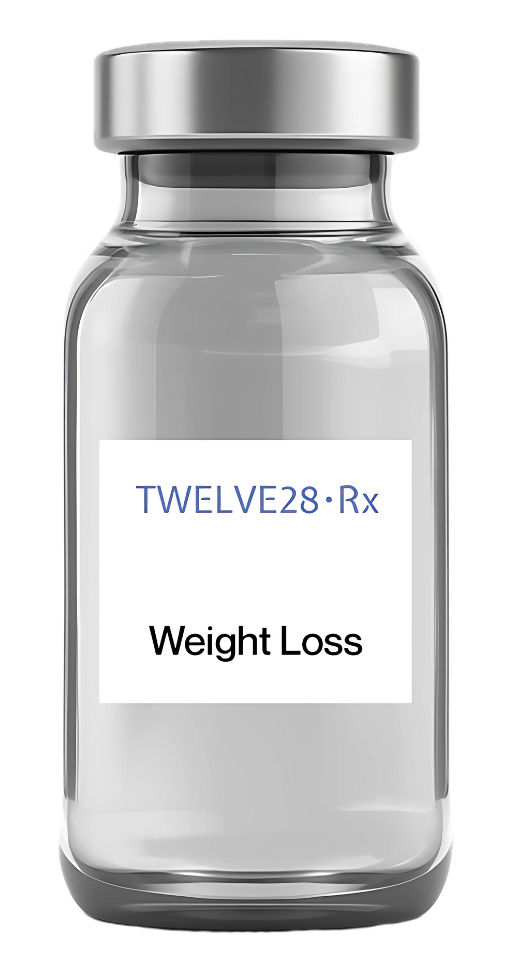
Weight Loss Medications
At Twelve28Rx, we offer medically guided weight loss solutions, including both injectable and oral treatments. Our licensed providers use proven treatments within a structured program to help you jumpstart progress, break plateaus, and achieve lasting results, no guesswork, just personalized care.
Medical Weight Loss Solutions Designed for Success
At Twelve28Rx, we believe successful weight loss isn’t about guessing. It’s about using proven, medically guided solutions tailored to fit your life. While our program follows a standardized protocol using clinically backed medications and therapies, your path to success is uniquely yours. Whether you’re aiming to jumpstart your weight loss, break through a plateau, or finally reach your goal weight, our licensed providers create a structured plan tailored for results, designed for your body, your goals, and your lifestyle.

Real Treatments. Real Results.




Treatment Plans
GLP-1 medications are a class of prescription drugs that not only improves blood sugar control but may also lead to weight loss. This class of drugs is commonly called glucagon-like peptide 1 (GLP-1) agonists. Weight loss can vary, depending on which GLP-1 drug you use and the dosage. Studies found people using Semaglutide and making lifestyle changes lost about 33.7 pounds (15.3 kilograms) versus 5.7 pounds (2.6 kilograms) in those who didn’t use the drug. GLP-1 medications are generally taken by an injection given weekly, depending on the drug.
Some of the more common side effects include:
Nausea, Vomiting, Diarrhea.
Side effects can often be mitigated by correctly titrating your dosage upward, so you’ll want to ensure that you are taking the medication exactly as prescribed by your provider to minimize risk and/or severity of side effects. Anti-nausea medications such as ondansetron (generic Zofran) are also helpful to assist in mitigating nausea.
Low blood sugar levels (hypoglycemia) are a more serious risk linked to the GLP-1 class of drugs. But the risk of low blood sugar levels often only goes up if you’re also taking another drug known to lower blood sugar at the same time, such as sulfonylureas or insulin. The GLP-1 class of drugs isn’t recommended if you have a personal or family history of medullary thyroid cancer or multiple endocrine neoplasia. Lab studies have linked these drugs with thyroid tumors in rats. But until more long-term studies are done, the risk to humans isn’t known. The GLP-1 class of drugs is also not recommended if you’ve had pancreatitis.
References: https://www.mayoclinic.org/diseases-conditions/type-2-diabetes/expert-answers/byetta/faq-20057955
Subscription Plan
A monthly supply, with automatic renewal every 1 month unless canceled.
Order Fulfillment
A licensed provider will review your order within 48 hours. Processing may take 7–10 business days, depending on our pharmacy partners. Once processed, your order ships via 2-day delivery.
These medications should be stored in the refrigerator between doses. GLP-1 medications are sensitive to temperature and could degrade if not stored properly.
You can take GLP-1 medications at any time during the day, without regard to meals. If your dosage is prescribed to take weekly, you should take your dose on the same day each week.
Please discuss your previous prescription and dosage with your provider during your medical intake process when enrolling and if medically appropriate, your provider will coordinate your dosage accordingly.
Disclaimer:
This product is prescribed by a licensed healthcare provider based on individual medical needs. It has not been evaluated or approved by the U.S. Food and Drug Administration (FDA). It is not intended to diagnose, treat, cure, or prevent any disease. Compounded medications are not FDA-approved, and their safety and effectiveness have not been independently verified by the FDA. This information is provided for educational purposes only and is not a substitute for professional medical advice.

Dedicated doctors in every state
Twelve28Rx delivers convenient, clinically guided care solutions like weight loss, hair restoration, and overall wellness. Our licensed providers offer personalized treatment plans you can access from the comfort and privacy of your home, no waiting rooms, no guesswork, just expert care made simple.
Get Your Prescription

Contact us
Getting started with Twelve28Rx is easy. We offer customized online visits for each medical condition we treat, enabling our healthcare providers to focus exclusively on the patient’s symptoms and medical history.

Online Consultation
Once you’ve reached out to us, you can consult with one of our specialized healthcare professionals. If you qualify, our healthcare professionals will provide you with clinically proven treatments

Rush “No Contact” Delivery
We offer rush “no contact” delivery of your prescribed medications and treatment products. We prioritize your convenience and privacy, ensuring that your treatments are delivered promptly to your preferred address.
FAQ's
What is a glp-1 (semaglutide)?
Semaglutide is a GLP-1 receptor agonist approved by the FDA to improve blood sugar control in adults with type 2 diabetes and to support chronic weight management in certain patients when combined with diet and exercise. It works by mimicking a natural hormone that helps regulate appetite, food intake, and blood sugar levels. Under medical supervision, it may be prescribed as part of a comprehensive wellness plan.
What glp-1/GIP (tirzepatide)?
Tirzepatide is a once-weekly injectable medication that activates both GLP-1 and GIP receptors—two natural hormone pathways involved in blood sugar and appetite regulation. It is FDA-approved to improve glycemic control in adults with type 2 diabetes. In some cases, and under medical supervision, tirzepatide may also be prescribed as part of a comprehensive plan to support chronic weight management.
What’s the difference between semaglutide and tirzepatide?
Semaglutide is a GLP-1 receptor agonist, while tirzepatide activates both GLP-1 and GIP receptors. Both are FDA-approved injectable medications used to improve blood sugar control in adults with type 2 diabetes and may also be prescribed to support chronic weight management under medical supervision.
Tirzepatide’s dual action may offer added benefits in appetite regulation and metabolic support for some patients, but the best option depends on individual health goals, response, and tolerance. Your provider will help determine which is most appropriate for you.
How do I administer my GLP-1 medication?
If your GLP-1 medication comes in a vial (such as compounded semaglutide or tirzepatide), it is administered as a subcutaneous (under the skin) injection. You will draw up your prescribed dose using an insulin syringe and inject it into fatty tissue—typically the abdomen, thigh, or upper arm.
Always follow your provider’s instructions for dosing, injection technique, and site rotation. Store the vial according to your pharmacy’s directions, and never reuse needles or syringes.
If you’re unsure how to administer your injection safely, contact your healthcare provider or pharmacist before proceeding.
Are there side effects with weight loss injections?
GLP-1 medications like semaglutide or tirzepatide may cause side effects. The most common are mild and may include nausea, constipation, diarrhea, or decreased appetite—especially when starting treatment. These often improve over time as your body adjusts.
In rare cases, more serious side effects like pancreatitis or gallbladder issues may occur. It’s important to follow dosing instructions closely and stay in communication with your healthcare provider throughout your treatment.
Who is eligible for weight loss medications?
GLP-1 medications like semaglutide and tirzepatide are FDA-approved for adults with type 2 diabetes to improve blood sugar control. Some GLP-1 medications are also approved for chronic weight management in adults with a body mass index (BMI) of 30 or greater, or 27 or greater with a qualifying weight-related condition (such as high blood pressure, insulin resistance, or high cholesterol).
Eligibility is determined through a full medical evaluation by a licensed provider, who will consider your health history, current medications, and personal goals before prescribing.
Are there contraindications to starting weight loss injections?
While GLP-1 medications like semaglutide or tirzepatide can be effective tools for weight management, they are not appropriate for everyone. Contraindications may include a history of certain gastrointestinal disorders (such as severe gastroparesis), pancreatitis, or allergies to any of the medication’s ingredients.
Your provider will review your full medical history, current medications, and lab work to determine if these injections are safe and appropriate for you. Always disclose any health conditions or symptoms prior to starting treatment.
When will I receive my prescription?
Our physicians will see you within 24-48 hours. Once you are approved, please allow 7-10 business days for the pharmacy to deliver to your home. Some pharmacies may require less or more time for delivery.
How do I contact my dr I spoke to?
There is a space at the bottom of your email from the Dr to respond. Our drs are always available for questions.
How do I give myself an injection?
When you are approved by your assigned Dr for treatment, you will receive a link to an instructional video on how to inject.
Tirzepatide is a once-weekly injectable medication that activates both GLP-1 and GIP receptors—two natural hormone pathways involved in blood sugar and appetite regulation. It is FDA-approved to improve glycemic control in adults with type 2 diabetes. In some cases, and under medical supervision, tirzepatide may also be prescribed as part of a comprehensive plan to support chronic weight management.
Semaglutide is a GLP-1 receptor agonist, while tirzepatide activates both GLP-1 and GIP receptors. Both are FDA-approved injectable medications used to improve blood sugar control in adults with type 2 diabetes and may also be prescribed to support chronic weight management under medical supervision.
Tirzepatide’s dual action may offer added benefits in appetite regulation and metabolic support for some patients, but the best option depends on individual health goals, response, and tolerance. Your provider will help determine which is most appropriate for you.
If your GLP-1 medication comes in a vial (such as compounded semaglutide or tirzepatide), it is administered as a subcutaneous (under the skin) injection. You will draw up your prescribed dose using an insulin syringe and inject it into fatty tissue—typically the abdomen, thigh, or upper arm.
Always follow your provider’s instructions for dosing, injection technique, and site rotation. Store the vial according to your pharmacy’s directions, and never reuse needles or syringes.
If you’re unsure how to administer your injection safely, contact your healthcare provider or pharmacist before proceeding.
GLP-1 medications like semaglutide or tirzepatide may cause side effects. The most common are mild and may include nausea, constipation, diarrhea, or decreased appetite—especially when starting treatment. These often improve over time as your body adjusts.
In rare cases, more serious side effects like pancreatitis or gallbladder issues may occur. It’s important to follow dosing instructions closely and stay in communication with your healthcare provider throughout your treatment.
GLP-1 medications like semaglutide and tirzepatide are FDA-approved for adults with type 2 diabetes to improve blood sugar control. Some GLP-1 medications are also approved for chronic weight management in adults with a body mass index (BMI) of 30 or greater, or 27 or greater with a qualifying weight-related condition (such as high blood pressure, insulin resistance, or high cholesterol).
Eligibility is determined through a full medical evaluation by a licensed provider, who will consider your health history, current medications, and personal goals before prescribing.


